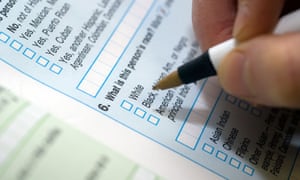Be Careful What You Wish For
"The fear is legitimate. It's something I worry about."
"It's very hard for us now to sort of reject that [new census initiative to identify Americans originating in the Middle East or North Africa] wholly, because we've been working on it for decades."
"To be a community that’s invisible has been a real problem for us."
"Whether it’s a local school district trying to make decisions about English-as-a-second-language classes, or Voting Rights Act protections, or health research . . . we’d love to be able to say, 'This estimate is based on this data'. It means we could have our category the same way 'Hispanic' does. . . . People will be able to finally see themselves in the census."
"We've been telling our members: We understand why you're concerned, it's a legitimate concern. Let's just proceed with caution."
Maya Berry, executive director, Arab American Institute
"I would feel some wariness because you don't know exactly the consequences of what's coming next after you check the box."
"I don't want to fool myself to think that checking another box [other than the new one] is going to protect me in some way."
Zahraa Ballout, Dearborn, Michigan
"This is a big deal. The last time they did anything like this was with Hispanics before the 1980 Census."
William Frey, demographer, Brookings Institution
"Some Iranians are very Iranocentric; they really want it to be known that they are separate from Arabs, and when you’re talking about race, Iranians are quick to remind you that Iranians are white." "But I think it’s good to have some kind of minority status, and if that means that we’ve got to get together with others from the same region, I think there’s some good that can come of that."
"When you first come here to America, you are kind of a third-class citizen. People have a tendency to put their heads down and not make any noise and just get through their daily lives. But then you have their children who grow up here and say, 'How can I sit back and complain about everything being run by old white men if I don’t get involved?' It’s realizing that your voice counts."
Maz Jobrani, Iranian American actor and comedian
 |
| Colour coded … a large number of US citizens will have to check a new box on the census form if plans to redefine whiteness come to fruition. Photograph: Alamy Stock Photo |
For decades Arab groups in the United States have advocated that the U.S. census add a special box to identify the origins of mostly Muslims who have originated from the Middle East and North Africa. The proposed box is their initiative to be included on new census forms and it would be labelled "Middle East/North Africa". Its purpose, to enable the Census Bureau to gather data to identify the numbers present in the United States from those regions.
Now, their efforts have borne fruit. The Census Bureau, for the first time, on February 28 recommended the inclusion of the new category. The Office of Management and Budget is now reviewing the recommendation and is expected to make its decision later in the year. A new category appearing in the 2015 census was a test pilot where people of Middle Eastern or North African descent could check off the identifying box.
The addition of the box is now viewed, according to the Census Bureau, as an optimal way to obtain a count of Americans more accurately than currently pertains. According to the Arab American Institute, up to 3.7 million people have Arab roots, living in the United States, while the Census Bureau's estimate gives the presence of 1.8 million Arab Americans, according to data they have accessed, who live in the United States. The disparity is a good enough indication that no accurate national numbers exist.
And since the numbers can be extremely useful in investigating, as an example, whether particular medical conditions are more common than not in people of that background, accurate numbers represent a working tool to validate already existing suspicions of certain ailments striking people of particular origins.
Whether perusing numbers of the Arab American Institute, or those of the Census Bureau, both reflect immense growth in that population base, since 2000. And both the Arab American Institute and the Census Bureau, now support the usefulness on the 2020 census of the new box, representing people originating from 19 countries in the regions in question.
The much-sought-after box inclusion has now, however, despite vastly pre-dating the presidency of Donald Trump, who has repeatedly expressed his opinion of the need for a Muslim registry for people living in the United States -- but for reasons of security as a backlash against internal and external threats from Islamist fanatics -- gained a problematical presence. Which juxtaposition now makes the very people who have agitated for the box for decades, more than slightly unsettled that it may finally become a reality.
Labels: Census, Immigration, Middle East, North Africa, United States

<< Home